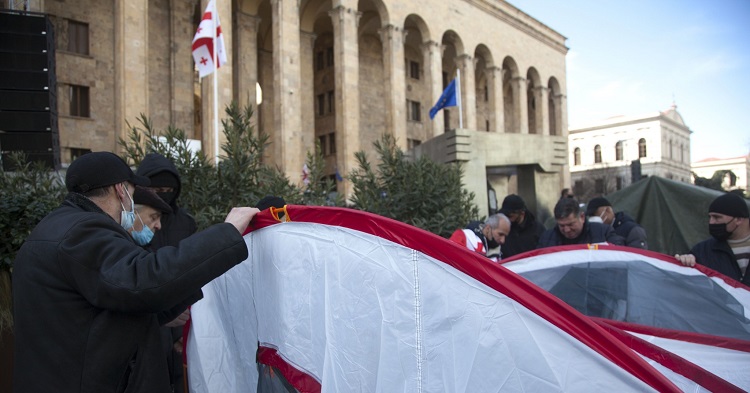OSCE/ODIHR disapproves of Georgian bill limiting erection of constructions at rallies

The GD proposed the bill to limit erection of temporary constructions during rallies at specific occasions after the claims by the State Security Service in September of an “unrest” being planned by opposition groups this fall. Photo: Nino Alavidze/Agenda.ge
The Organisation for Security and Co-operation in Europe’s Office for Democratic Institutions and Human Rights this week disapproved of the bill proposed by the Georgian Dream ruling party in September to limit erection of temporary constructions during rallies as “disproportionate”, with a potential “chilling effect on the exercise of the right to freedom of peaceful assembly”.
The GD proposed the bill following claims by the country’s State Security Service in September of an “unrest” being planned by opposition groups this fall, with the legal piece banning setting up of constructions if they “pose threats to demonstrators or other individuals”, or hamper police efforts to ensure order, work of institutions, organisations or other facilities.
The amendments also ban installation of constructions if they are not related to a specific rally or demonstration, and notes local authorities would consider each case individually to ensure freedom of assembly and expression.
The Parliament approved the bill with its third and final reading on October 5, before President Salome Zourabichvili vetoed it later during the same month, pointing to its “undemocratic” nature.
In its opinion, published on Monday on the request of the Georgian Public Defender’s Office, the OSCE/ODIHR said participants “should be free to determine how they want to convey their message, including by the temporary erection of structures during assemblies, to reach their audience or otherwise achieve their purpose”.
It noted in some cases, the particular manner and form of a protest, such as a temporary campsite, could acquire “symbolic significance inseparable from its message”.
Saying the Organisation was unable to assess the reality of the security threats cited in the bill, the comments said imposing restrictions on the basis of potential risks could be “unjustified”.
They [restrictions] seek to address an alleged security risk that is temporary in nature – October-December 2023 as indicated in the explanatory note – by introducing restrictions that will continue to apply even after the potential security risks will cease, thereby questioning the proportionality of the contemplated measures”, it said.
The document also noted the proposed amendments could “indirectly discriminate” against those expressing political dissent or opposition, “who may be more inclined to use ‘occupy’-style manifestations, which would generally involve erecting temporary constructions, to convey their message”.
 Tweet
Tweet  Share
Share